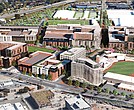Mexico neighbor not enemy
3/11/2016, 1:16 p.m.
Jesse L. Jackson Sr.
Presidential campaigns often turn raw. Politicians reach for sound bites that bite. Often they gain by playing on fears, winning by division, not by addition. In 2016, insult has become the coin of the campaign, particularly in the Republican primaries. And too often the enemy singled out has been Mexico and Mexicans.
Mexico has been burlesqued as a source of illegal immigrants who are slandered as rapists and criminals. Mexico is accused of taking our factories abroad and Mexican immigrants of stealing our jobs at home. Trumpets sound for building a wall across a 2,000-mile border, for deporting millions of Mexicans living in America, for booting out the dreamers who were born here, and more.
We would be wise to step back and take a deep breath. Mexico isn’t our back door; it is our next door neighbor. One hundred million people live in the 10 U.S. and Mexican states along the border region, and taken together, these form the equivalent of the fourth largest economy in the world. Our ties with Mexico are deep, our peoples intertwined. They should not be reduced to a sound bite or an insult.
Thirty-four million Mexicans and Mexican-Americans live in the United States; about 22 million were born here. Every day, the United States and Mexico exchange $1.4 billion in two-way trade. Mexico is our second largest export market after Canada. Mexico buys more U.S. goods than all of the BRICS (Brazil, Russia, India, China and Singapore) combined, nearly as much as the entire EU. Mexico is the third largest supplier of crude oil to the United States. It is the largest export market for U.S. refined petroleum products and a growing market for our natural gas.
Cooperation between our two great countries is inescapable. We must and do coordinate on transportation, on legal entry points, on international organized crime, on trans-border infectious diseases and trans-border environmental challenges. In recent years, focus has necessarily been placed on criminal activity — the flow of drugs coming north and the flow of guns and contraband cash going south. We are the biggest market for illegal drugs in the world. Our appetites feed the criminal drug rings that threaten entire countries. We have an obligation and a national interest in bolstering enforcement on both sides of the border.
We don’t need a wall; we need a bridge. We are neighbors, bound together by geography and by history. Now we hear all these fulminations about undocumented workers. People don’t leave their homes on a lark. They flee parched earth for green grass. For too long, we have exploited Mexican workers on both sides of the border. They pick our fruit and vegetables. They clean our houses. They fight and die in our wars, hoping for a green card and a shot at an American dream. Mexicans didn’t take our jobs to Mexico; U.S. corporations used NAFTA to take our jobs to Mexico. Mexicans don’t seek sub-minimum wages here. U.S. employers exploit the undocumented to pad their own pockets.
This furious debate about immigration is taking place as illegal immigration has virtually disappeared due to the lack of jobs in the United States. The biggest flood of immigration came after NAFTA forced family farmers in Mexico to compete with subsidized agribusiness in the United States. Many lost their lands and their livelihood and came north to survive. We need economic policies that work for working people on both sides of the border, not a policy of division and insult that allows employers to keep exploiting workers in both countries.
America’s strength is its diversity. And our security is enhanced by having close relations with our neighbors. American workers have every reason to be angry about an economy that is rigged to work against them and a politics that is corrupted by big money. But our Mexican neighbors didn’t do that, and building a wall won’t change it. The politics of insult ends up insulting us.
The writer is founder and president of the Chicago-based Rainbow PUSH Coalition.







